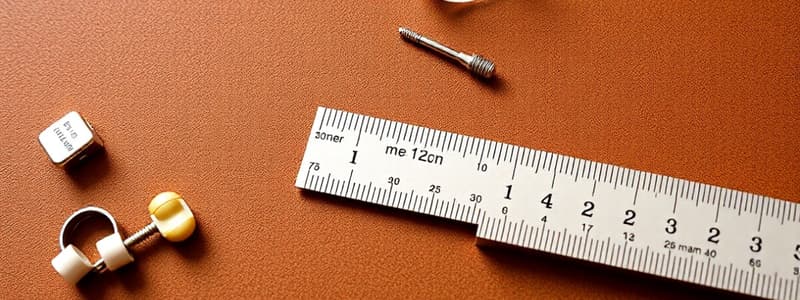Podcast
Questions and Answers
What is a measurement?
What is a measurement?
- A complex formula without any quantification.
- Only a number without any units.
- A random estimate of a property.
- A number coupled with a unit that defines a property. (correct)
What distinguishes direct measurement from indirect measurement?
What distinguishes direct measurement from indirect measurement?
- Direct measurements rely on formulas to calculate values.
- Direct measurements use only numerical values.
- Direct measurements are always more accurate.
- Direct measurements are obtained directly from an instrument scale. (correct)
Which of the following is NOT a type of physical quantity?
Which of the following is NOT a type of physical quantity?
- Mass
- Length
- Temperature
- Brightness (correct)
What is required to report the result of a measurement effectively?
What is required to report the result of a measurement effectively?
How is an indirect measurement typically calculated?
How is an indirect measurement typically calculated?
Flashcards
What is a measurement?
What is a measurement?
The combination of a number and a unit that quantifies an object's property. For example, "300 meters" measures the length of something.
Direct measurement
Direct measurement
A measurement where the value of the physical quantity is directly read from an instrument's scale.
Indirect measurement
Indirect measurement
A measurement where the value is calculated using a formula and values obtained from direct measurements.
What is a physical quantity?
What is a physical quantity?
Signup and view all the flashcards
Mass
Mass
Signup and view all the flashcards
Study Notes
Foundation Physics - Measurement of Physical Quantities
-
Measurement Defined: Scientists use established logical rules to communicate information quantitatively. Measurements must be expressed in multiples of standard units.
-
Measurement Example: Reporting the distance between two cities, one's weight, or the length of a lecture requires specifying the result in terms of a standard unit (e.g., 300 meters).
-
Measurement Components: A measurement is the combination of a number and a unit that quantifies an object's property.
Types of Measurements
-
Direct Measurement: Determining a physical quantity's value directly from an instrument's scale. For example, using a ruler to measure length.
-
Indirect Measurement: Calculating a physical quantity using a known relationship (formula) between that quantity and other directly measured quantities. For example, calculating circumference from a diameter (using π).
Physical Quantities
-
Physical Quantity Defined: A physical quantity represents an object's property measurable in terms of size, magnitude, or amount.
-
Types of Physical Quantities:
- Length
- Mass
- Time
- Temperature
- Amount of Substance
- Luminous Intensity
- Current
Studying That Suits You
Use AI to generate personalized quizzes and flashcards to suit your learning preferences.




